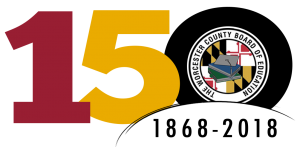By Morgan Pilz, Staff Writer
 (June 28, 2019) Children’s education has been moving forward with innovative teaching and programs which actively engages students, as showcased during the presentation provided by three Worcester County science teachers to the board of education, June 18.
(June 28, 2019) Children’s education has been moving forward with innovative teaching and programs which actively engages students, as showcased during the presentation provided by three Worcester County science teachers to the board of education, June 18.
The three educators along with Coordinator of Instruction Jen Sills, demonstrated the shifts in science teaching and learning occurring in response to the adoption of the Next Generation Science Standards and administration of the Maryland Integrated Science Assessment.
Next Generation Science Standards is a multi-state effort to create new education standards that are rich in content and practice and arranged in a coherent manner across disciplines and grades to provide all students an internationally benchmarked science education.
“Maryland is one of 41 states that is using the Next Gen Science Standards to drive science instruction,” Sills said. “These standards are much different from what we’ve been used to in the past. They require much more than just content and facts memorization.”
Next Gen Science uses three-dimensional learning; science and engineering practices, disciplinary core ideas and crosscutting concepts, which requires systems learning and models to explain phenomena and allows students to conduct investigations, solve problems and engage in discussion instead of just being provided the information by the teachers.
“The students need to recognize how to do science,” Stephen Decatur Middle School seventh grade science teacher Lindsay Harrington said. “These are the skills they need to have in order to be successful in science education or science careers.”
The program has added a new approach to research and learning outside of lecture-styled instructions. According to Harrington, the classroom has been “transformed as students become more engaged.”
The lessons are now instituted in a way that shows more teamwork and access to information in a way traditional science learning has not utilized.
Next Generational Science Standards incorporates reasoning skills used in language arts and mathematics to help students improve mastery and understanding in all three dimensions for science-based learning.
“As a county, we’re really focused on making sure our students are going to be provided with rigorous, three-dimensional science instruction,” Sills said. “They are tested through all the content they get from third to fifth grade, then it’s tested in eighth grade and in the high school level they are tested after two science courses.”
Using MISA, or Maryland Integrated Science Assessment, the program assesses the three dimensions of the NGSS using stimuli and item sets that focus on real-world context or phenomena.
Students must use their understanding of the three dimensions to make sense of the information provided to them within the MISA item sets.
“We familiarize them with the three dimensions, using proven methods they can use instantly in the classrooms,” Stephen Decatur seventh grade science teacher Caleb Wilson said. “One of the first things, as teachers, is we teach them about phenomena … strange happenings that [occur] in the world. We get them to explore those phenomena and answer those questions about those phenomena.”
This year, eight science teachers formed a committee to build teacher capacity and confidence in the Next Generational Science Standards, the three dimensions and science instructional shifts, develop science teacher leaders and revise the current curricula and build assessments that work best with this new program.
For the following year, the committee has plans to continue engaging teachers in high-quality, relevant, collaborative learning, revising and developing K-12 science curricula, develop current teacher leaders and expand those teams to include elementary teacher leaders and foster classroom environments where students know, do and think like scientists and engineers.
